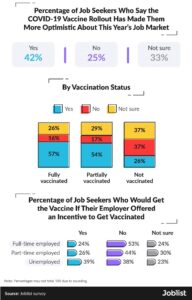The first recovery from the pandemic gave optimism and hope for a brighter future for hospitality workers. Then the Delta variant hit. But still the industry is showing signs of growth if only in starts and stops.
Now comes the fun part: getting hospitality workers back to their pre-pandemic posts. This can be quite challenging. Not only are industry leaders competing with unemployment and stimulus payments, but also with the same obstacles that were in place before the virus.
Nothing to Do with Covid-19
According to a recent Joblist survey, hospitality workers who lost their jobs due to the pandemic will not return to work. This is even if they lose their unemployment payments. Just over 50 percent of those surveyed said they’re switching industries in pursuit of a different job setting.

A recent Bloomberg article cites a few reasons why hospitality workers won’t be coming back to their jobs. According to a cited survey, these include:
- 52 percent want a different work setting
- 45 percent are looking for better pay
- 29 percent want better benefits
- 19 percent are seeking a more flexible work schedule
- 16 percent prefer remote work opportunities as opposed to showing up on site every day
Many of these reasons existed long before Covid. These were workers who were going to bail whether there was a pandemic or not. Interestingly these weren’t the only reasons for changing jobs.
The Real Reasons
The motivation for a worker to return back to their hospitality job is slim to nonexistent. And it’s not all because of the desire for a change in pay and benefits. Instead, it is the desire to avoid the un-pleasantries of the past.
Unfortunately, there exists in the hospitality industry an underlying current of distasteful, and even illegal actions against employees. These include not only disrespectful customers, but also sexual harassment by managers and customers, as well as emotional abuse by managers.
A survey of 4,700 hospitality workers conducted by Snagajob and Black Box Intelligence found that disrespect in the workplace was their main reason for not going back to their job. 15 percent surveyed said they were sexually harassed by customers. Another 15 percent stated they were sexually harassed by managers and coworkers.
Harassment has been going on for years in the hospitality industry without much reporting of incidents. In fact, in a report dating back to 1993, the Human Rights Commission found that, “Harassment levels in hospitality are certainly higher than those in other industries.”
Unreported and Accepted
Sexual harassment is so prevalent in the hospitality industry is because it is tolerated. Many of the respondents stated in the report, “It is just joking and having fun,” and “We are all an open minded bunch of people.” Part of the problem is that the hospitality industry is comprised mostly of young adults. The median age is 31 according to the US Bureau of Labor Statistics.
The harassment as well as the emotional abuse from managers is accepted by many industry workers. Unfortunately, the lingering effects of the treatment is carried by the employee to other jobs. This leads them to tolerate sexual assault associated with accepted workplace behavior. Some workers may carry the scars they received from the industry for a very long time.
And the hospitality industry is typically the first door many workers use to begin their working lives. In fact, the Restaurant Opportunities Centers United report finds that one out of three Americans enters the workforce through the restaurant industry, and one out of two works in the industry at some point in their life.
In other words, between one third and one half of all Americans learn acceptable workplace behavior in the restaurant industry. If they deem various forms of harassment as acceptable, they will take it with them to other jobs. This doesn’t have to continue.
What Operators Can Do Now
Leaders can begin turning around, or at least slowing down the exodus of workers. By focusing on implementing the following initiatives, you should be able to curb the turnover rate and increase attraction to your business.
- Institute zero toleration policies- Put in writing, separate from your Employee Handbook, policies that explain a zero tolerance for anything disrespectful. This includes sexual harassment, any form of discrimination, and any hint of emotional abuse by managers. And enforce it!
- Train managers- Hold weekly or monthly training sessions to train and retrain mangers on how they should treat their subordinates. Capture the training on video to simplify future training.
- Train employees- Training is not always a convenient task, but it is necessary. Give employees resources so they know how to report harassment or abuse and let them know that they will be respected and protected. Train employees to report abusive behavior by the customer. The customer is not always right in these situations.
- Place posters in the workplace– Communicate your message of zero tolerance by placing posters where employees can see them everyday. Send out emails and texts with reminders about respecting others.
These are simple steps to take to try to turn around decades of tolerance of harassment. It will take time to change this soiled reputation found in the hospitality industry. However, it at least conveys the message that your business is trying to do the right thing.
Bringing Back the Workforce
There is a lot of work to do in the hospitality industry to lure back workers. Some changes are already taking place with increase in wages, sign-on bonuses, child care, career advancement plans, and more.
The pandemic gave time for workers to reflect on their workplace and ponder their future. Given the availability of jobs today, it is no wonder many of those in the hospitality field are jumping ship. But it doesn’t have to be that way.
Industry leaders will need to take a stand. The tolerance of yesterday will need to be replaced with swift action against abusers and harassers. The changes in money and benefits is an easy fix, but not if workers don’t feel they are protected and respected.





